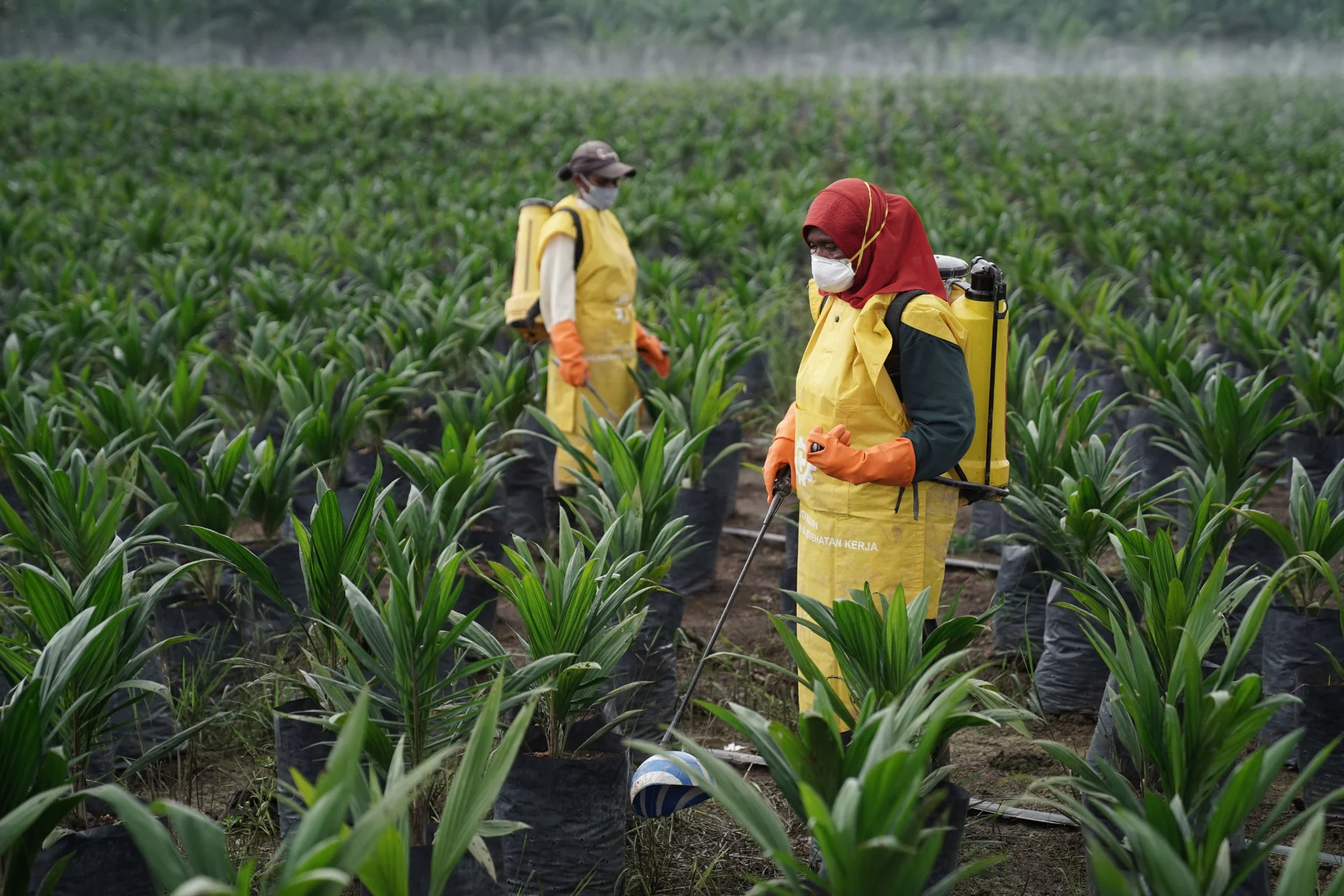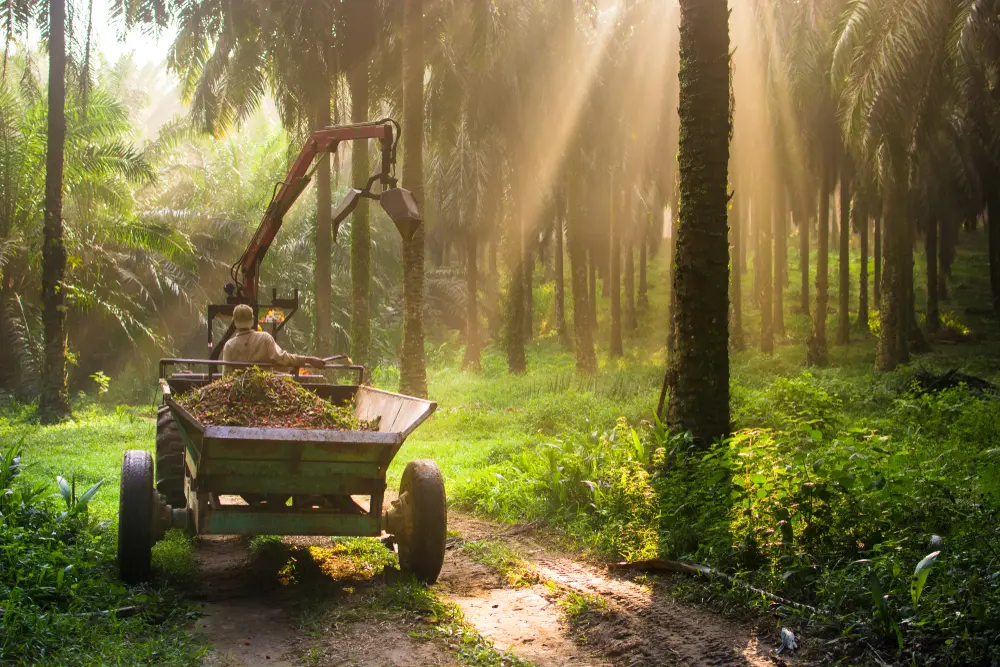Sustainability Strategy
The Company’s sustainability strategy is built on a commitment to compliance with the highest laws, regulations and sustainability standards in the palm oil industry.

Environmental Stewardship
EHP is committed to managing the environment and strives to always implement business practices that minimize our impact on the environment by calculating our water consumption, energy consumption, and emissions generated as well as managing effluents, waste recycled and biodiversity. This commitment is realized by establishing a Sustainability Policy that is being reviewed on a regular basis, thoroughly covering our operational activities and all third party suppliers, as well as efforts to minimize the use of chemicals, prohibit the use of paraquat, prohibit pesticides class 1A and 1B according to the World Health Organization (WHO), and chemicals listed in the Stockholm Convention and the Rotterdam Convention, except in exceptional circumstances which may occur in cases where their use has been validated by a due diligence process or when authorized by government authorities during an outbreak.

Biodiversity
We consider biodiversity amongst our priorities because many EHP plantations are located near natural and protected forests which are natural habitats for endangered, rare and threatened species where these areas are considered to have High Conservation Value (HCV).
HCV Assesment
Find an example of an HCV assessment executive summary undertaken prior to 2015
SEIA Assesment
Find an example of a summary for the SEIA (Social & Environmental Impact Assessment)

Traceability
The supply chain in the palm oil industry is a complex chain as it includes suppliers that range from large-scale plantations such as EHP plantations to local smallholders. At the upstream of the supply chain, Fresh Fruit Bunches (FFB) are harvested and then taken to a palm oil mill to be processed into Crude Palm Oil (CPO) before going through a refining and further processing.
List of Palm Oil Mills 2024
Go to the list of our oil mills alongside the locations.
FFB Supplier Data and Traceability 2024
Go to the list of our supplier data and traceability.
Certifications
To assure that the economic, environmental, social and governance aspects across all operational units comply with sustainability standards, PT Eagle High Plantations Tbk (EHP) is committed to participating in the RSPO and ISPO sustainability schemes.

Fire Prevention and Management
Forest fires are an issue that needs to be prioritized because apart from causing negative impacts on ecosystems and biodiversity, they also put the health and socio-economic conditions of the surrounding communities at risk.
As a member of the Indonesian Palm Oil Association (GAPKI), the Company is committed to implementing palm oil best practices to operate without burning.

Grievance Mechanism
EHP is committed in implementing transparency in our business activities which is also written in the Company’s Sustainability Policy. Therefore, EHP has set up a grievance mechanism that aims to ensure that every complaint, both internal and external, is treated in accordance with Company regulations and prevailing laws and as a guideline in implementing communication with relevant stakeholders.
Grievance Handling Matrix
Grievance Handling Matrix
Activity Recipient Authorization Action Registration of complaint Assistant/Coordinator/Askep/KTU Relevant Manager - Anyone can receive complaints (Internal & External
- All complaints must be recorded
- AM must be informed
Complaint that may be handled by the recipient Assistant/Coordinator/Askep/KTU Head/Manager - Issue must be able to be analyzed based on its level of importance
- Minutes can be made if needed
- The root cause must be identified
- The solution/response must be able to eliminate the root cause
Complaint that needs to be handled by other department (non-recipient) Assistant/Coordinator/Askep/KTU Respective Department Head/ Manager - Handover complaints must be recorded properly
- Follow advanced SOP instructions (e.g. land claim complaints -> Dept. P&L -> SOP for land loss compensation)
- If necessary, involve the Sustainability team
- Minutes can be made if needed
- The root cause must be identified
- The solution/response must be able to eliminate the root cause
Complaints involving third-parties Manager AM/RH/PH - Mediation efforts should be made so that the case is not brought to the court, if possible
- Legal department can be involved
- Reporting to BOD
Documentation and reporting Manager Head CSR & Head HCCS - Every month, a complaint recap should be made
- Discuss and use as a reference for future preventive measures
- Report in the monthly report for each department
Types of Complaints
Type of Complaints
- 1.Complaints related to employment are complaints which are related to problems that arise in the work relationship process and or deviations from work conditions and company regulations/policies received by employees, such as: benefits-facilities, superior-subordinate relationship/fellow colleagues, reward-punishment, whistleblower, ethics/deviant behavior, sexual violations, and other violations.
- 2.Complaints related to non-employment are complaints which are related to facilities for the public interest such as: toilets, lighting, sports facilities, provision of stationery, delivery of packages/documents, provision of facilities, provision of food, shuttle etc.
- 3.Community complaints are complaints which are related to community claims, or the disruption of the surrounding community with the Company's operations.
- 4.Customer complaints are companies submitted by buyers who make purchasing and selling transactions for products produced by the Company.
- 5.Other complaints are complaints which are submitted to the Company other than points 1-4 above, for example complaints from other relevant stakeholders.
Complaints that may be submitted include:- 1.
Grievance Cases
Grievance Cases
No Date Received Reported Company Summary of Grievance Source Status Actions 1. 18 Mar 2024 PT Tandan Sawita Papua Clarification of employment cases on compensation rights. Wilmar - Buyer Closed as per 3 April 2024 The company informed that the case has been resolved with the relevant parties in June 2023. The company sent proof of a statement letter that the mutual peace agreement has been signed by both parties, both management and employees concerned. 2. 17 Nov 2023 PT Suryabumi Tunggal Perkasa There is a shortage of land that should have been given by the company to the Cooperative to fulfill the 20% plasma land. GAR - Buyer Closed as per 24 Nov 2023 Based on the results of the KPPU decision Case Number 03/KPPU-K/2021 regarding the point "Ordering the Reported Party to fulfill the obligation of 20% of Plasma land when obtaining land for the release of Forest Areas or Other Use Areas", the Company agrees and has carried out accountability related to Plasma land obligations through reporting at an agreed period. Reporting has been done twice with the first report number 004/SC/EKS-STP/III/2023 and the second report number 014/SC/EKS-STP/IX/2023. 3. 11 Oct 2023 PT Bumihutani Lestari Clarification of fire alerts in company's concession areas mentioned in the Neste grievance list report. PT. Synergy Oil Nusantara-Batam (IFFCO Group) - Buyer Closed as per 2 Nov 2023 The company conducted verification in the consession area during the reporting period and no potential fires were found. Eagle High Plantations was also not included in the Neste grievance list. 4. 27 Dec 2022 PT Bumihutani Lestari, PT Singaland Asetama, dan PT Jaya Mandiri Sukses Clarification and ensure deforestation free in GAR (buyer) supply chain. GAR - Buyer Closed as per 23 Nov 2023 The company checked and conducted field verification and submit the field verification evidence to buyer. It was informed that there are indication the potential land clearing in the submitted area carried out by communities for the purpose of farming. 5. 27 Dec 2022 PT Eagle High Plantations Tbk Complaints relate to workers' rights and working conditions. FSBun Rajawali - NGO Closed as per 12 Jan 2023 This Complaint is closed and placed under RSPO Post-Complaints Monitoring (PCM). EHP provide a written update (endorsed by the Complainant) on a monthly basis from August 2023 - December 2023 on the progress of the implementation of the Bilateral Engagement Agreement. Complaint resolution details can be found here: https://rspo.my.site.com/Complaint/s/case/5000o00003Zaxh8AAB/detail 6. 27 Jun 2022 PT Bumihutani Lestari Clarification regarding Mighty Earth Rapid Response report #40 on alleged deforestation by one of EHP's suppliers, PT Arjuna Utama Sawit ("PT AUS") that are still listed in the Eagle High Plantations Annual Report for 2021. Wilmar - Buyer Closed as per 27 Jul 2022 The Company confirmed that the Company's CPO purchase contract with PT AUS has expired in September 2018 and the Company has not sold FFB to PT AUS since December 9, 2019 so that PT AUS is included in the Company's 'no purchase' list and the Company has no transactions with PT AUS. 7. 27 Mei 2022 PT Bumihutani Lestari Clarification regarding indications of deforestation within PT Bumihutani Lestari ("PT BHL") concession of 1.19 Ha in the IV quarter of 2021. Sinarmas Agri - Buyer Closed as per 6 Jun 2022 The Company confirmed that PT AUS is still recorded in the latest Consolidated Financial Statements of EHP as receivables and payables to PT AUS due to the absence of a set-off agreement as the basis for the Company to offset. However, the Company's CPO purchase contract with PT AUS expired in September 2018 and the Company has not sold any FFB to PT AUS since December 9, 2019 so PT AUS is included in the Company's 'no purchase' list. 8. 4 Apr 2022 PT Eagle High Plantations Tbk Clarification regarding indications of peatland clearing at PT Arjuna Utama Sawit ("PT AUS") which according to the 2021 Financial Report is still listed as one of EHP's FFB suppliers. The sender requests PT AUS to immediately issue a moratorium on land clearing (Stop Work Order) and send a copy of the statement letter to the sender of the complaint. If PT AUS claims to have conducted HCS/HCV studies, the sender would like to ensure that the studies have been conducted based on the results of Peer Review conducted by HCSA/HVCRN institutions. Sinarmas Agrip - Buyer Closed as per 4 Apr 2022 The company confirmed that the area is within the location permit and the activity is carried out by the surrounding community for farming. The response also attached the minutes of the field inspection. 9. 23 Dec 2021 PT Suryabumi Tunggal Perkasa Clarification regarding indications of land clearing at PT Suryabumi Tunggal Perkasa of approximately 2 Ha in November 2021. Clarification required includes whether the area is within the concession, whether it was done by the Company, and if done by the Company whether it has gone through HCV-HCS assessment. Apical Group - Buyer Closed as per 20 Jan 2022 The company confirmed that the area is within the location permit and the activity is carried out by the surrounding community for farming. The response also attached the minutes of the field inspection. 10. 15 Dec 2021 PT Sawit Sukses Sejahtera Clarification regarding indications of land clearing at PT Sawit Sukses Sejahtera of 4.8 Ha in December 2021. Clarification required includes whether the area is within the concession, whether it was done by the Company, and if one by the Company whether it has gone through HCV- HCS assessment. Apical Group - Buyer Closed as per 5 Jan 2022 The Company has confirmed that as of March 2021 PT Sawit Sukes Sejahtera is no longer part of the Company's business group but has been sold to another party, namely a subsidiary of the TPG Group based on the Deed of Sale and Purchase made notarially on March 16, 2021, and has been reported / notified to the Ministry of Law and Human Rights of the Republic of Indonesia and has also made Information Disclosure to comply with the provisions of the Financial Services Authority, as the information disclosure link below:
SHORT LINKComplaints Submissions
Complaints Submission
Complaints can be submitted directly to the relevant estate/mill/department to be documented in the register or can also be submitted via:- 1.
This online form
- 2.
The minimum data required in submitting a complaint are as follows:- 1.
Date
- 2.
The “Claimer”
- 3.
Contents of complaints and/or claims
- 4.
Date and response/response given by the Company
- 5.
Completion date and fields
- 1.
Social Responsibility
Corporate Social Responsibility
We aim for a better social relation impact by nurturing the society.
01Conflict Resolution
We commit in resolving conflicts with a negotiation that could leave positive resolution outcomes between parties.
02Human RIghts and Labor
We believe that every human is special and created as equal, to each his or her own.
03